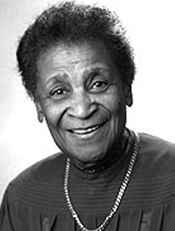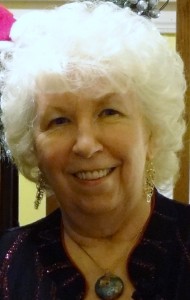February is Black History Month; March is Women’s History Month. Either one is an appropriate time to look back at the life of Dr. Carrie Best.
In the history of Nova Scotia — home of the largest indigenous Black community in Canada — Dr. Best was well-known and admired for her many years of work on behalf of her people. She died in 2001 but not before she had made her mark and helped to dispel some of the egregious racism that existed throughout her life.

She was born in New Glasgow in 1903. In 1946, she founded The Clarion, the first newspaper for Blacks in Nova Scotia. She wrote for newspapers and magazines and was a weekly columnist with The Pictou Advocate. She was the author of an autobiography, That Lonesome Road (which is also a social history of Nova Scotian Blacks.)
She was well-known across the country as an equal rights activist and was a founding member of the Kay Livingstone Visible Minority Women of Nova Scotia, an organization which works with women and young people to promote a sense of identity and pride of race, integrity and self-discipline “and to lift others, as we ourselves climb toward dignity and self-respect.”
Her last doctorate was awarded in 1992 by the University of King’s College in Halifax. In 1970, she was awarded the Lloyd MacInnis Memorial Award for her work in social justice. In 1973, she received the first annual award of the National Black Coalition of Canada. In 1974, she was appointed to the Order of Canada. In 1975, she was granted the degree Doctor of Laws by St. Francis Xavier University.
In December of 1991, she received an award for outstanding contributions to human rights on the anniversary of the day the United Nations ratified the Declaration of Human Rights.
I interviewed her a few years before her death at her home in New Glasgow. She scoffed at my tape recorder and refused to let me turn it on, telling me she didn’t want to talk into “that thing.” I returned to the time-honoured tradition of taking notes. Her words are in italics. My occasional comments are not.
The ‘religious hobo’
Dr. Best is in perpetual motion, rummaging in her well-packed briefcase for a pertinent document, punctuating her remarks with a gentle jab to her interviewer’s shoulder or a soothing pat to the knee. Her energy and vitality are infectious. She often speaks with tongue in cheek.
* * *
I was invited to give the convocation address to the Atlantic School of Theology. I nearly dropped dead when they asked me! They can’t mean me, I said. Do they know I don’t go to church? Well, I slept on it. I do live close to God — I’m a born-again Christian — but I consider Christianity and “churchianity” two different things.
In the end, I accepted. I described my religious background to them and told them I was a “religious hobo.” When I was born, my parents were Salvationists and that’s how I was registered at birth. When I was a young child, they left the Army because the first “black church” had been established in Pictou County. That was Baptist.
When I grew up, I had the bad taste to marry an Anglican but he was good enough to go to the Baptist church with me. After a time though, he missed the Anglican way of worshipping so … he had accommodated me and I thought it was my turn to accommodate him so I went to the Anglican Church with him. But I missed the Baptists. The Baptists clap and laugh and sing and really know how to praise the Lord. So I went back to the Baptists. You can see I’m a religious hobo.
As I got older, I met so many wonderful people of all religions. I began to accept people for what they are — colour and creed don’t matter. I believe that all roads that lead to God are good.
The root of my faith is Mother Earth. I think of all the little creeds as just different ways of interpreting God.
So that’s what I told the graduates of the Atlantic School of Theology!
* * *
That Lonesome Road is dedicated to her mother. On the dedication page, she wrote, “Society Said: You are an inferior being,/born to be a hewer of wood/ and a drawer of water/ because you are Black…. My Mother Said: You are a person, separate/ and apart from all other/ persons on earth. The pathway/to your destiny is hidden…/ you alone must find it./ …And then she said…/ Take the first turn right,/ and go straight ahead…”
* * *
It’s very painful to talk about some of the practices of the past. When I was growing up in New Glasgow, you couldn’t eat in a restaurant. You couldn’t get your hair cut. I went to jail. My son and I were at the movies; we sat downstairs, we went to the movies three times a week and we’d sat in the same seats for years. Then one day, the usher came to me and said, “You can’t sit here. You have to go into the balcony.” I refused. They called the police; they had to drag me out of there. I was in jail for an hour. I was charged with causing a disturbance.
But at all times of my life, I’ve been a happy person. When I was young, I think we might have been broke but we were never poor. I was personally just as happy no matter what we had. My personal happiness had nothing to do with racial discrimination.
I confront bigotry face on. If I hear — and this has happened — that someone has called me “nigger,” I go right to that person. I look him right in the eye and I say, “did you call me ‘nigger’? Now I’ve heard you did and all I want from you is to tell me if it’s true. If you say it isn’t, I’ll believe you. We’ll go together to the person who told me and you will tell him it isn’t true.” You could always tell if it was true or not.
I’m not a nigger. I’m as good as anyone and better than most. I love everyone who’s worthy of my love — but I won’t sit back and take that kind of bigotry.
* * *
Her memory seems unlimited. She quotes long stanzas of poetry, long passages from books, most of which were learned many years ago. She considers poetry to be part of her spiritual nature and part of her search for identity.
“The long hours spent in reading poetry,” she wrote in That Lonesome Road, “and the hundreds of poems memorized during my early childhood, my learning years, my yearning years and even now in later life, are fragrant memories of my journey in Search of an Identity. The irresistible habit of committing poems to memory still persists, and like deposits in a savings account, can be drawn out at will. The fund is never exhausted, for the interest grows both on deposit and withdrawal and is compounded daily.
“Black history was virtually non-existent in Nova Scotia during my learning years … I remember when I received my cherished volume of the Poetry of Paul Lawrence Dunbar. I was ten years old … I found to my utter astonishment and delight that I could read the Dunbar poems which were written in the Negro dialect as easily as those he had written in classic English. These gave me my first sense of Black Identity.”
* * *
Things have changed — but not enough. The white race has got to start learning from those they feel superior to. The Blacks have to take pride in who they are. When Frederick Douglass was a young slave, the white mistress said, “He’s a bright boy. I’d like to teach him to read.” The slave master said, “When you educate a Negro, you unsuit him for a slave.”
Education is very important — more important than ever. We have to start teaching our children ourselves — in “kitchen schools.” We have to get funding from Black churches, Black organizations, and take the time to teach the children where they come from, how far they can go.
Being old now is not a disadvantage to me in all my projects. It’s a blessing. God gave me this extra time to accomplish whatever I can, to meet wonderful people of all races. I’m so thankful.




